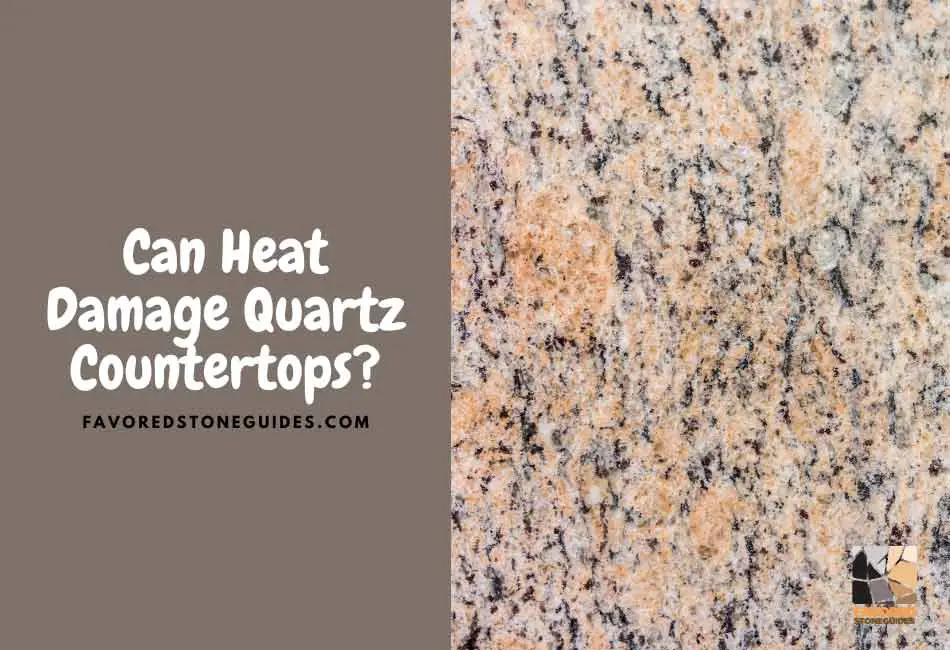Heat damage is a common concern when it comes to quartz countertops. Quartz is a non-porous, heat-resistant material that can withstand temperatures up to 300°F (150°C).
However, even though it may be able to withstand high temperatures, this does not mean that it will never suffer from heat damage.
Heat Resistance of Quartz Countertops
- Quartz countertops are made of a mixture of up to 93% quartz crystal, bound together with resins and pigments.
- These material gives quartz its strength and durability, as well as its resistance to heat.
- The materials used in the making of quartz countertops are designed to resist temperatures up to 300°F (150°C).
- It is important to note that this temperature refers only to the surface of the countertop and not the entire material.
- Because quartz countertops are composed of several different layers, they don’t conduct heat as well as natural stone materials like granite or marble.
- This means that it may be more vulnerable to damage from heat sources if they’re too close or left in contact with the surface for an extended period of time.
- It is important to be aware of this when dealing with any heat source near quartz countertops, as certain temperatures can cause discoloration or cracking over time if not properly managed.
Things That Affect The Heat Resistance of Quartz Countertops
The resins and pigments that are used in quartz countertops play a big role in their heat resistance. The resins help to seal the quartz, protecting it from external damage.
They also act as an insulating barrier, helping to deflect heat away from the surface of the material. This helps to prevent discoloration and damage from any direct contact with heat sources.
The pigments used in quartz countertops are also important for protecting the material from discoloration and fading.
Finally, certain types of sealants can be applied to quartz countertops to further increase their heat resistance.
These sealants can help to keep the quartz protected and prevent any damage caused by external heat sources.
Factors that Contribute to Heat Damage in Quartz Countertops
1. Direct Exposure To High Temperature
Direct exposure to high temperatures for an extended period of time can cause discoloration and crack in quartz countertops.
It is important to keep heat sources away from the surface of the material or use protective barriers to shield it from direct contact with extreme temperatures.
2. Uneven Distribution of Heat Across the Surface of The Countertop
Uneven distribution of heat across the surface of the quartz countertop can also cause discoloration and cracking.
This is especially important to note if you are using a hot pan or other objects on the surface of your quartz countertop.
It is important to ensure that any heat sources are evenly distributed across the surface, avoiding any hot spots or areas of direct contact.
3. Poor Quality Installation or Maintenance
If your quartz countertop has not been properly installed or maintained, it can be more vulnerable to heat damage.
It is important to make sure that the quartz countertop is sealed properly and that it is regularly cleaned to prevent discoloration and other damage caused by heat.
4. Use of Hot Cookware or Appliances Without Protection
Hot cookware or appliances, such as a stove or oven, should not be placed directly on the surface of quartz countertops.
It is important to use protective barriers, like trivets and cutting boards, to help prevent discoloration and cracking.
5. Exposure to Sunlight or UV Rays
Excessive exposure to sunlight or UV rays can also cause discoloration and fading in quartz countertops. It is important to avoid direct contact with these types of light sources, as they can damage the material over time.
Effects of Heat Damage on Quartz Countertops
1. Discoloration or Fading
Discoloration or fading can occur if quartz countertops are exposed to high temperatures for an extended period of time. This type of damage is often irreversible and cannot be repaired.
2. Cracking
Cracking and other types of physical damage can also occur if the quartz countertop is exposed to high temperatures for an extended period of time.
3. Warping or Bending
Warping or bending can occur if the quartz countertop is exposed to very high temperatures, such as those that come from a stove or oven. This type of damage may be difficult to repair and can weaken the structural integrity of the material.
Prevention and Protection against Heat Damage in Quartz Countertops
1. Use Protective Barriers or Trivets
Using protective barriers, such as a trivet or cutting board, is essential when using hot cookware or appliances on quartz countertops.
This helps to prevent any direct contact with heat sources and prevents discoloration and cracking.
2. Keep Heat Sources Away from the Surface of The Countertop
It is important to keep heat sources away from the surface of the quartz countertop, as this can cause discoloration and other damage.
3. Regularly Clean and Reseal The Quartz Countertop
Regularly cleaning and resealing your quartz countertop can help to protect it from heat damage. This helps to maintain its appearance and prevents discoloration and other damage.
4. Limit Exposure to Sunlight or UV Rays
Limiting exposure to sunlight or UV rays can help to prevent discoloration and fading in quartz countertops. It is important to keep these light sources away from the surface of the material, as they can cause irreversible damage over time.


